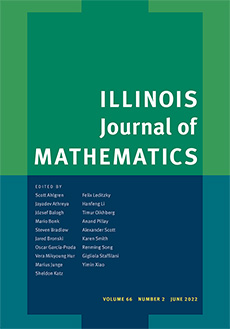Abstract
Let $(k_{n})$ be a strictly increasing sequence of positive integers. If $\sum_{n=1}^{+\infty}\frac{1}{k_{n}}$ $=+\infty$, we establish the existence of an entire function $f$ such that for every $\lambda\in(0,+\infty)$ the set $\{\lambda^{k_{n}}f^{(k_{n})}(\lambda z):n=1,2,\ldots\}$ is dense in the space of entire functions endowed with the topology of uniform convergence on compact subsets of the complex plane. This provides the best possible strengthened version of a corresponding result due to Costakis and Sambarino (Adv. Math. 182 (2004) 278–306). From this, and using a non-trivial result of Weyl which concerns the uniform distribution modulo $1$ of certain sequences, we also derive an entire function $g$ such that for every $\lambda\in J$ the set $\{\lambda^{k_{n}}g^{(k_{n})}(\lambda z):n=1,2,\ldots\}$ is dense in the space of entire functions, where $J$ is “almost” equal to the set of non-zero complex numbers. On the other hand, if $\sum_{n=1}^{+\infty}\frac{1}{k_{n}}<+\infty$ we show that the conclusions in the above results fail to hold.
Citation
N. Tsirivas. "Common hypercyclic vectors for certain families of differential operators." Illinois J. Math. 60 (3-4) 625 - 640, Fall and Winter 2016. https://doi.org/10.1215/ijm/1506067283
Information





